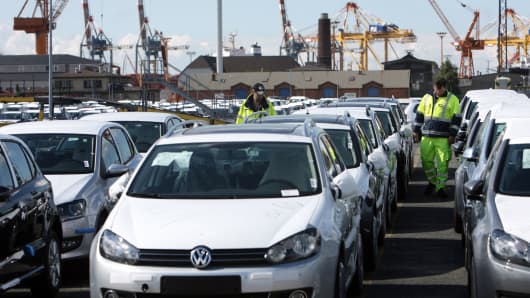
Patrik Stollarz | AFP | Getty Images
Volkswagen cars at the harbor of Bremerhaven, Germany.
The Commerce Department is expected to deliver its long-awaited report on auto tariffs to the president by a Feb. 17 deadline, according to two sources familiar with the matter. But as President Trump deliberates his next moves – by law, he has 90 days to decide –he will face an uphill battle from companies, foreign allies and Republican lawmakers if he decides to impose duties.
The report was crafted under section 232 of a 1962 trade law, a provision that allows tariffs on items that threaten national security that was scantly used before the Trump Administration. In March 2018, the president used the provision to slap duties on foreign steel and aluminum, and called for an investigation into automobiles several months later, tweeting before the research was conducted that he'd be interested in a 25 percent rate.
Trade war will bring debt crisis within two years, Emergent Asset CEO says
Whether the Commerce Department took the president's lead in recommending tariffs on all imported automobiles is unclear. But such a move would face resistance in the West Wing. "There's not a whole lot of support for auto tariffs," a senior administration official told CNBC. "But only one person's opinion matters."
In July 2018, President Trump called on Twitter for tariffs of 20 percent on foreign automobiles, and in November upped the suggestion to 25 percent following news of layoffs at General Motors.
Business groups are already warning of the economic impacts. A new study by the Center for Automotive Research found a 25 percent tariff on autos and parts would increase the price of a car by an average of $2,750 and as many as 366,900 U.S. jobs would be lost. Its analysis factors in exclusions for South Korea and assumes Canada and Mexico would also be exempt under the yet-to-be-passed U.S. Mexico Canada trade agreement.
Pro-free-trade Republicans are building new tools to push back, in case the president implements new tariffs in the name of national security.
Sen. Pat Toomey (R-PA) introduced a bill last month that would give Congress sixty days to approve any proposed tariffs under section 232. It would also apply retroactively to steel and aluminium tariffs, giving Congress 75 days to pass a resolution to approve those tariffs.
Sen. Toomey says he has heard from dozens of Pennsylvania companies who use steel and aluminium products who have been hurt by the increased cost of materials. "We have seen this administration use this tool in a way that was never intended," said Toomey.
Sen. Robert Portman (R-OH) also has a proposal to address what he sees as the misuse of national security in trade fights. Under his proposal, the Pentagon would make the primary determination that a tariff is needed, not the Commerce Department. And Congress would have the right to disapprove of those measures.
Retaliatory tariffs hit U.S. boating industry
Sen. Portman said his measure is timely because of the widespread opposition among Republicans to placing tariffs on auto imports, most of which come from allied countries. Any action taken out of spite, and not because of a true security concern, will backfire.
"If it's not based on fairness, it comes back to haunt us," Portman said. "If you are going to say minivans from Canada are a national security threat, Canada is going to react, knowing that's not legitimate."
Sen. Chuck Grassley (R-IA), chairman of the influential Senate Finance Committee, is working to come up with a compromise between Toomey and Portman's proposals that can get broad bipartisan support. But he brushed off any association between that effort and the Trump Administration's recent actions.
"Our moving on 232 has nothing to do with autos or aluminium or steel, it's comes from the proposition that Congress in 1962 delegated too much Constitutional authority to the president," Sen. Grassley told reporters on Wednesday.

